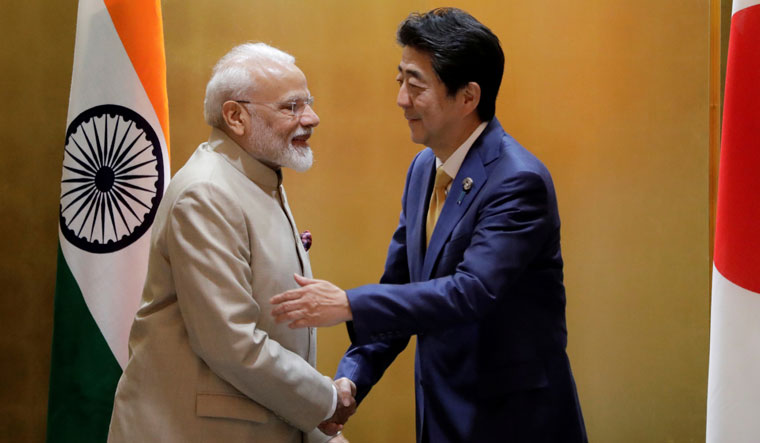Shinzo Abe came from a long line of politicians. His father Shintaro Abe was foreign minister when I was a junior officer. His grandfather Nobusuke Kishi, who was prime minister from 1957 to 1960, visited India as a guest of Nehru when young Abe was a boy. Eiasku Sato, who was prime minister in the 70s, was the longest serving till Shinzo Abe broke that record.
I first met Abe when he was a junior MP from the same LDP faction as PM Yoshiro Mori who made a historic visit to India in August 2000, at the time of PM Vajpayee. Together, they announced global partnership between the two countries. Abe, as PM, had many meetings with Manmohan Singh. Abe came to India as PM in August 2007. PM Singh arranged for Abe to address our Parliament. There, Abe made his speech about the 'confluence of two seas' and his vision of cooperation between India and Japan in particular, and the wider Pacific and Indian Ocean.
I was in Delhi at the time for the first ever academic conference which brought the top universities of the two countries together. I was a professor at Keio University whose president led the Japanese delegation. Abe inaugurated this conference. I had first interacted with him as ambassador from 2000 to 2003. Abe was the deputy chief cabinet secretary under Chief Cabinet Secretary Yasuo Fukuda and PM Junichiro Koizumi. During his first tenure as PM, apart from his visit in August 2006, he met PM Singh in Tokyo in December 2006. I happened to be there at the time. The two prime minister upgraded the Global Partnership established by PM Mori in August 2000 in Delhi where I was a member of the Indian delegation. Abe, in December 2006, with PM Singh, raised the partnership to a strategic and global level. I happened to be in Tokyo at that time as well.
PM Singh invited Abe to be our chief guest at Republic Day 2014. I was present in Delhi and met Abe at a dinner in his honour by our PM. This was the first time that a Japanese PM had been invited to witness India's military forces and weapons. Abe had followed his predecessor in trying to make Japan a more' normal' country in terms of attitudes to the armed forces.
The ingrained pacifist tendencies in Japan after the atomic bombings of 1945 were slowly but surely reoriented by Abe, to look upon the armed forces with a new respect and to appreciate the vital role they played in protecting the security of the country and the wider region. It is a little-known fact that, though small in numerical strength, the Japanese armed forces are the most powerful in the Pacific, and thus a credible counter force to an aggressive China.
With India, Abe worked assiduously with successive PMs to widen the security relationship first established by PM Mori and Vajpayee to focus on naval cooperation. The annual Malabar exercises between the Japanese, Indian and US navies was one of the symbols of Japan's new policy orientation under Abe. The bullet train project in India was another symbol of Abe's vision to share with India the highest levels of Japanese technology. Abe will be remembered in many countries of the ASEAN region and Europe, and of course in India, as a man who was committed to sharing the best of Japan with friendly countries of the world
Abe was at the Imperial Palace in November 2015 ,standing beside Emperor Akihito when they jointly conferred upon me Japan's highest honour the Grand Cordon of the Order of the Rising Sun. The citation mentioned my contributions over almost sixty years towards strengthening relations between our countries. I later met Abe in Delhi in December 2015, when he came on a bilateral visit.
Japan, and the world at large, will remember Abe for many years to come.
India has lost a devoted and loyal friend.
The author is former ambassador to Japan, Greece and Vietnam





